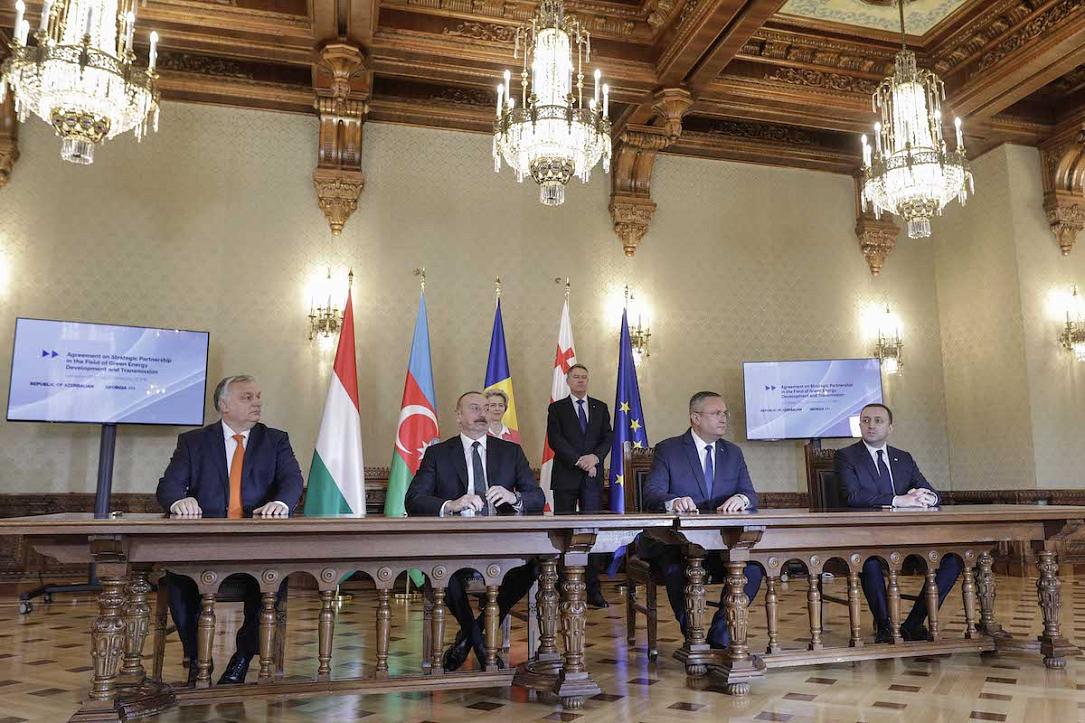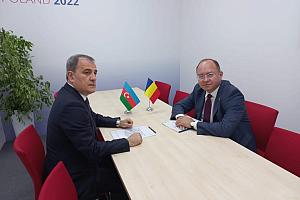EC promises to fund Romania-Georgia strategic undersea cable project

The leaders of Azerbaijan, Georgia, Hungary, and Romania signed an agreement in Bucharest on December 17 to build a 1GW undersea electric interconnector through the Black Sea for transporting "green" energy from Azerbaijan to Hungary and further to Europe. The 1,200-km cable is not supposed to be ready before 2029 and is estimated to cost EUR 2.3 bln.
CESI consultancy firm of Italy is carrying out a feasibility study paid by Georgia with World Bank money, but it rather seems aimed at choosing from among alternative solutions (as opposed to estimating whether the project makes sense). At the same time, Prysmian (also of Italy) notably announced in November that it is building a new ship to lay submarine cables.
"Since the beginning of the Russian war, we have decided to abandon Russian fossil fuel and diversify our options towards reliable partners in the energy field, such as those present at this table. And it is working," said Ursula von der Leyen, president of the European Commission.
The 1,100-kilometer cable from Azerbaijan to Romania will provide Azeri energy for the rest of the continent – it was said at the ceremony, Euronews.com reported. As explained by Azerbaijani President Ilham Aliyev, the Asian country currently produces 27 GW of wind and solar power [this is, actually, the total potential of the country, largely untapped as of now] and is developing projects that should increase this capacity by 4 GW by the end of 2027.
On purely economic merit, such a project would never be completed – but the EU Commissioner for Neighbourhood and Enlargement Olivér Várhelyi hinted, in a Tweet a couple of days earlier, that the EC would "allocate" EUR 2.3 bln for the Black Sea cable, out of the EUR 17 bln economic and investment plan of the Eastern Partnership (EaP).
Visibly, the project, with a predictable minor economic impact (significant for energy market balancing), is a political statement that comes to reinforce the morale across the EU countries ahead of the cold winter of 2023 to 2024. In longer terms., it greatly depends on the terms at the end of the Russian invasion of Ukraine.
At this moment, Azerbaijan doesn't have the promised "green" electricity, even if Georgia and Romania (or the EC) decided it would make sense to invest in the cable with the aim of transferring the "green" electricity to Hungary (plus Moldova, Western Balkans and Ukraine as well, as the EC president Ursula von der Leyen suggested).
Georgia's combined wind and solar power capacities are some 110MW altogether at this moment, according to the Azeri Ministry of Energy. But the state-controlled, highly centralized Azeri energy system counts on an agreement with United Arab Emirates' state company Masdar to develop 4,000 MW of green (wind, solar) power generation capacities.
The cable, with a capacity of transporting electricity at a rate of 1GW, would transfer on a yearly basis (if used at full capacity) 8.8TWh of electricity per year. This is the energy contained by 220 mln cubic meters of natural gas. Azerbaijan (the implied source of energy for the cable) exports over 20 bln cubic meters of natural gas per year (sometimes re-exporting gas from third-party sources).
Romania alone uses some 60TWh of electricity and 12 bln cubic meters of natural gas per year. Under these circumstances, claims such as those voiced by the leaders of the four signatory countries of the agreement are to be taken with a grain of salt.
iulian@romania-insider.com
(Photo source: Inquam Photos/George Calin)













